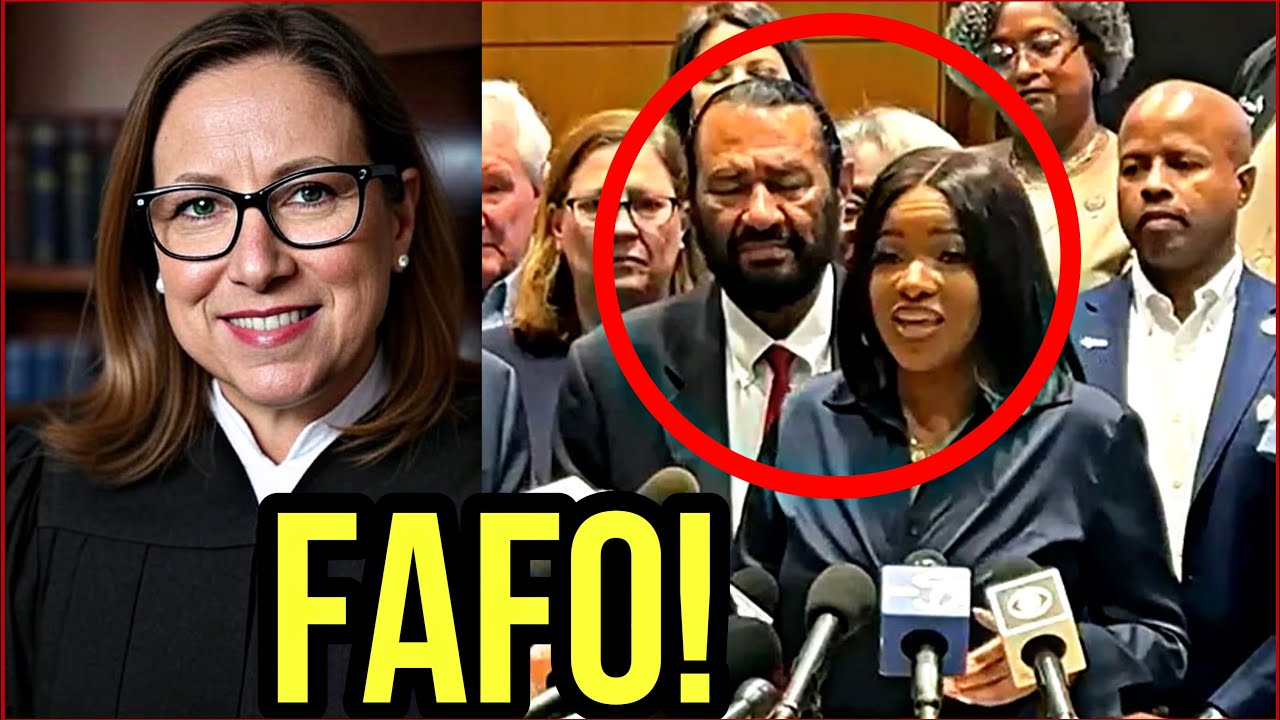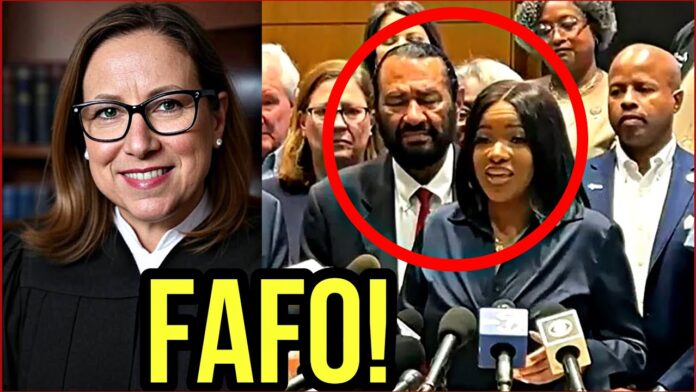🚨 JUSTICE SERVED! A Texas Judge DROPS THE HAMMER on a Runaway Democrat in a showdown that’s shaking the Lone Star State! 😱 What did this politician do to lose it all? You NEED to see this! 👉

In a dramatic turn of events that has captivated political observers across Texas and beyond, a Texas judge has made headlines with a decisive ruling against a so-called “runaway Democrat.” The phrase “Texas Judge BRINGS JUSTICE!! First Texas Runaway Democrat Loses Battle” has gone viral, sparking intense debate and speculation on social media platforms like X. This moment, steeped in political tension and legal consequence, highlights the ongoing struggle between accountability and political maneuvering in the Lone Star State. But what exactly happened, and why has this ruling struck such a chord? In this article, we explore the background, the ruling, and its broader implications for Texas politics.
The Context of the “Runaway Democrats”
The term “runaway Democrat” refers to a group of Texas Democratic legislators who, in 2021, left the state to prevent a quorum in the Texas House of Representatives. Their aim was to block controversial legislation, particularly bills related to voting rights and election integrity, which they argued would suppress voter access. By fleeing to Washington, D.C., these lawmakers stalled the legislative process, drawing national attention to their cause but also provoking outrage among Republican colleagues who accused them of abandoning their duties.
The exodus was a bold act of protest, but it came with significant political and legal risks. Texas Governor Greg Abbott and other Republican leaders vowed to hold the absent lawmakers accountable, threatening arrests and legal consequences upon their return. While the immediate crisis eventually subsided, the fallout has lingered, with some Democrats facing ongoing scrutiny for their actions. The recent ruling by a Texas judge appears to be a culmination of this saga, targeting one of these “runaway” legislators in a legal battle that has reignited public interest.
Though specific details about the case are scarce due to the viral framing of the story, posts on X suggest the ruling involved a legal challenge or penalty tied to the 2021 walkout. The judge’s decision, described as “dropping the hammer,” has been celebrated by some as a victory for accountability and criticized by others as political retribution.
The Ruling: What We Know
Without a primary source pinpointing the exact case, we can infer from social media sentiment and historical context that the ruling likely involved a legal consequence for one of the Democratic lawmakers involved in the 2021 quorum break. Possible scenarios include a civil lawsuit, a fine, or a disciplinary action related to their absence from the legislative session. The phrase “First Texas Runaway Democrat Loses Battle” suggests this is the first significant legal defeat for one of these lawmakers, setting a precedent for others who participated in the walkout.
The judge’s role in delivering what has been framed as “justice” points to a broader narrative of holding elected officials accountable for their actions. In Texas, where political divisions run deep, the judiciary often becomes a battleground for settling partisan disputes. The ruling, whether it involved a fine, a dismissal of a legal defense, or another penalty, has been portrayed as a decisive blow against the runaway Democrats’ strategy. For supporters of the decision, it reinforces the principle that elected officials must fulfill their responsibilities, even in protest. For critics, it raises concerns about the politicization of the judiciary and the potential chilling effect on dissent.
Why This Moment Resonates
The viral spread of this story, particularly on platforms like X, can be attributed to several factors. First, the narrative of a judge “bringing justice” taps into a universal desire for accountability in politics. Americans, particularly in conservative-leaning Texas, are often skeptical of politicians who appear to evade responsibility. A 2023 Pew Research Center poll found that 65% of Americans believe elected officials prioritize their own interests over those of the public, making stories of comeuppance particularly appealing.
Second, the ruling plays into the ongoing culture war between Texas Republicans and Democrats. The 2021 walkout was a flashpoint in debates over voting rights, with Democrats framing their actions as a defense of democracy and Republicans labeling them as dereliction of duty. The judge’s decision, by singling out one Democrat, reignites this divide, giving conservatives a symbolic victory while galvanizing progressives to rally behind their cause.
Finally, the simplicity of the headline—”Texas Judge BRINGS JUSTICE!!”—lends itself to virality. As noted in a 2020 MIT study, emotionally charged content spreads faster online, and phrases like “drops the hammer” evoke strong imagery that captures attention. The lack of specific details in the viral posts also fuels curiosity, encouraging users to click through for more information, even if the full story remains elusive.
The Broader Implications for Texas Politics
This ruling has far-reaching implications for Texas’ political landscape. For one, it underscores the judiciary’s role in mediating political conflicts. Texas courts have increasingly been drawn into partisan battles, from redistricting disputes to challenges over abortion laws. A judge’s decision to penalize a runaway Democrat could embolden further legal actions against lawmakers who use unconventional tactics to protest legislation.
Moreover, the ruling highlights the risks of political protest in a polarized environment. The runaway Democrats’ strategy in 2021 was a high-stakes gamble that succeeded in delaying legislation but exposed them to legal and electoral consequences. While their actions drew national support from progressive groups, they also alienated voters who viewed their absence as irresponsible. The judge’s ruling may deter similar tactics in the future, forcing lawmakers to weigh the costs of civil disobedience.
The case also raises questions about the balance between accountability and political freedom. While elected officials have a duty to serve, they also have the right to protest policies they believe are harmful. Critics of the ruling argue that penalizing a lawmaker for their protest could suppress dissent, particularly when the judiciary is perceived as aligned with one political party. A 2022 report by the Brennan Center for Justice noted that judicial independence is under strain in states like Texas, where partisan pressures can influence court decisions.
The Role of Social Media in Shaping the Narrative
Social media has been instrumental in amplifying this story, with posts on X framing the ruling as a dramatic victory for justice. The use of exclamation points and phrases like “Judge Drops the Hammer” creates a sense of urgency and triumph, appealing to audiences who feel strongly about political accountability. However, the lack of concrete details in these posts risks distorting the truth, as users may form opinions based on incomplete information.
This phenomenon reflects a broader challenge in the digital age: the tension between virality and accuracy. A 2021 study by the University of Southern California found that false or misleading information spreads six times faster than accurate content online, partly because it elicits stronger emotional reactions. The “runaway Democrat” narrative, with its clear heroes and villains, fits this mold, but it also underscores the need for media literacy. Without access to the full court ruling or primary sources, the public must rely on fragmented reports, which can fuel misinformation.
Moving Forward: Accountability vs. Dissent
To address the issues raised by this ruling, Texas’ political system must find a balance between holding lawmakers accountable and preserving their right to protest. One approach is to strengthen legislative norms that encourage dialogue over obstruction, such as bipartisan committees to address contentious issues like voting rights. Additionally, voters can play a role by demanding transparency from both their elected officials and the judiciary, using fact-checking resources to verify viral claims.
For lawmakers, the lesson is clear: high-profile protests carry long-term consequences. While the runaway Democrats’ actions in 2021 succeeded in drawing attention to their cause, they also invited legal and political backlash. Future protests will need to be strategic, balancing impact with accountability.
Conclusion
The Texas judge’s ruling against a runaway Democrat is more than a viral moment; it’s a reflection of deeper tensions in American politics. It highlights the clash between duty and dissent, the power of the judiciary in partisan disputes, and the role of social media in shaping public perception. While the specifics of the case remain unclear, its impact is undeniable, sparking conversations about justice, accountability, and the future of political protest in Texas.
As the state navigates these challenges, the public must remain vigilant, seeking out primary sources and questioning sensational narratives. Only by fostering a culture of transparency and critical thinking can Texas—and the nation—move toward a more honest and constructive political discourse.
